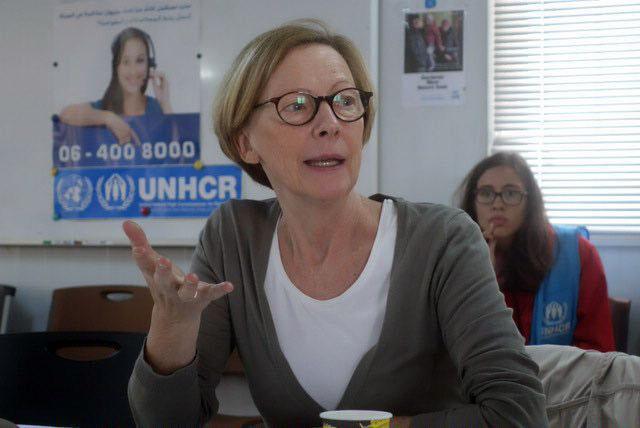
Germany celebrates Day of Unity with renewed partnership with Jordan
'Germany has traditionally been one of the closest cooperation partners of Jordan… The regional turmoil of the last years and the recognition in Germany that our partner Jordan had been particularly hard hit as a host country for Syrian refugees have led to a very considerable stepping-up of German assistance to Jordan over the last years,' the ambassador said.
Germany has increased both its funding for development cooperation and humanitarian assistance since the onset of the crisis and has become the second largest bilateral donor in Jordan, the ambassador told The Jordan Times on the occasion of the Day of German Unity, marked on Tuesday.Since 2012, the German government has provided 1.3 billion euros in development cooperation and humanitarian assistance to Jordan.
In 2016, annual commitments reached a volume of 478 million euros, according to the ambassador, adding that Germany's support to Jordan focuses on areas that challenge the development and the growth of the Kingdom.'Our wide-ranging assistance in the Jordanian water sector goes back decades,' Siefker-Eberle said, adding that there are ongoing projects in the areas of water and sanitation with a total value of 933 million euros.
'Within the water sector, we focus on the development and improvement of infrastructure, for example, drinking water pipelines and wastewater treatment plants. Ever since the beginning of the Syrian refugee crisis, we have paid special attention to those municipalities in the north of the country that have taken in refugees and helped improve drinking water supply and wastewater management,' she added.Some of the projects implemented in this regard include the construction of the Aqib-Pipeline that will ensure the distribution of water from a borehole field to host communities for 800,000 Jordanians and refugees and half of the country's 3,500 imams and waithat (female preachers) have been trained on water conservation, reaching out to 3,000,000 worshippers.
German support also covers several projects on increasing energy efficiency and the use of renewable energy resources in the water sector.Germany is providing 59 million euros for the construction of several modern photovoltaic plants, that will create solar energy for the Zaatari refugee camp, hospitals and other community buildings in host communities, Siefker-Eberle noted.
While working with Jordan to contribute to the country's socio-economic development, Germany has been also helping in the impact reduction of the Syrian crisis on the country.Since 2012, Germany's humanitarian assistance to Jordan amounts to 412.5 million euros. In 2017, assistance is expected to reach 110 million euros.
Germany has been a strong partner of UN-agencies in Jordan and supports them in providing the basic needs of refugees. With Germany's contribution to the UN World Food Programme in Jordan in 2016, all eligible Syrian refugees residing both in camps and in host communities could receive food assistance for eight months.Germany is working closely together with some Jordanian NGOs, such as Caritas Jordan and CARE International Jordan, she added.
Keen on enabling Jordanian companies to benefit from the agreement relaxing rules of origin for Jordanian exports, the ambassador said Germany and the EU were assisting Jordanian institutions in order to provide local companies with the necessary know-how to export to the EU.There are discussions currently with the Minister of Industry, Trade and Supply on how to create an easily accessible structure for export promotion and company level assistance, she continued.
Meanwhile, the Jordanian side needs to find a way to create a more enabling business environment and an improved investment climate in order to allow Jordanian companies to grow, export more and to attract foreign investors, the ambassador added.'Unfortunately, one year on, the use of the flexible rules of origin by companies in Jordan is very much below expectations. So far, only two companies in Jordan — two Syrian companies in Sahab industrial zone, which also employ hundreds of Jordanian workers — export to the EU under the new regime,' she said, noting that around 10 additional firms in Jordan have qualified, but have not yet started exporting
The main challenge seems to be the small size of companies in Jordan and the lack of knowledge about the EU market.'Jordan unfortunately does not have a system of export promotion with its own trade representatives in the EU, who know Jordanian products as well as the EU market. The EU market is highly competitive and Jordanian products are not well known. The EU has not been a traditional export market for Jordanian companies and overall Jordanian exports to the EU are very low,' she added.
Jordanian firms are encouraged to attend trade fairs in the EU, to present their products and to meet potential buyers, she said.
On cooperation in the military field, the ambassador said it has significantly increased over the last two years and will grow even further in 2018.

Legal Disclaimer:
MENAFN provides the
information “as is” without warranty of any kind. We do not accept
any responsibility or liability for the accuracy, content, images,
videos, licenses, completeness, legality, or reliability of the information
contained in this article. If you have any complaints or copyright
issues related to this article, kindly contact the provider above.


















Comments
No comment